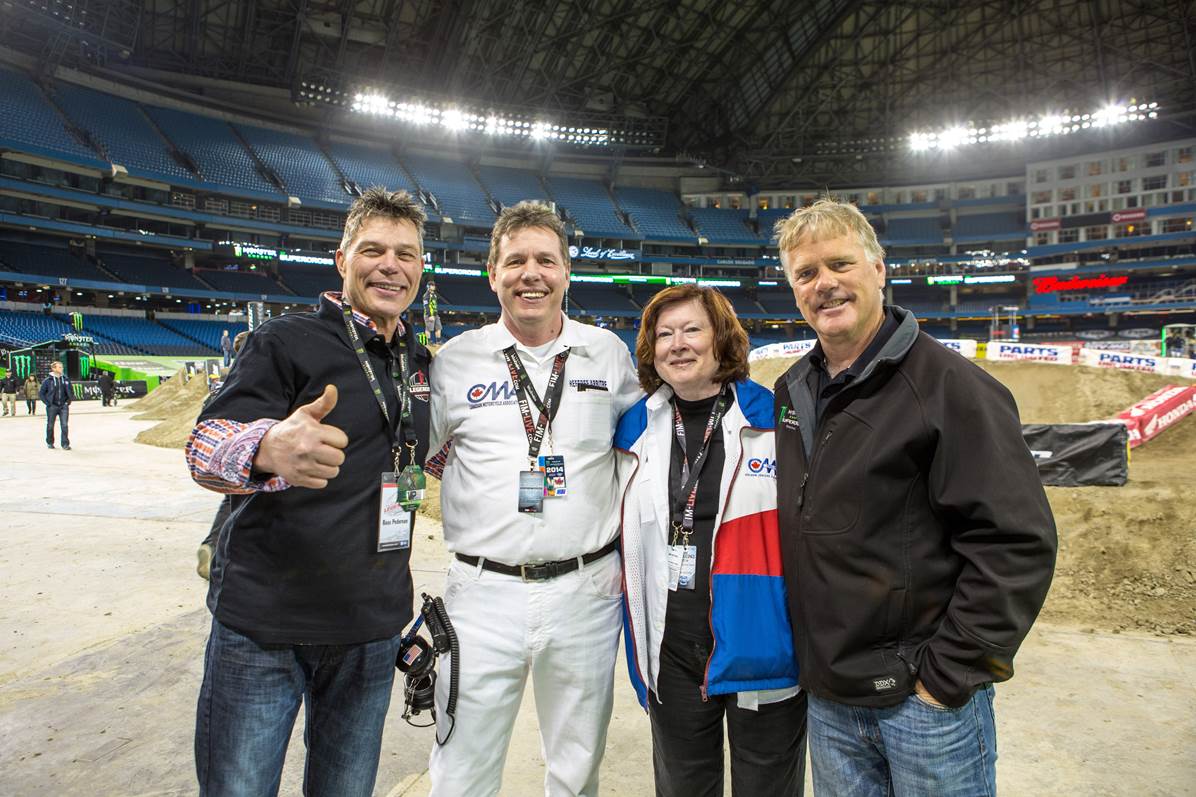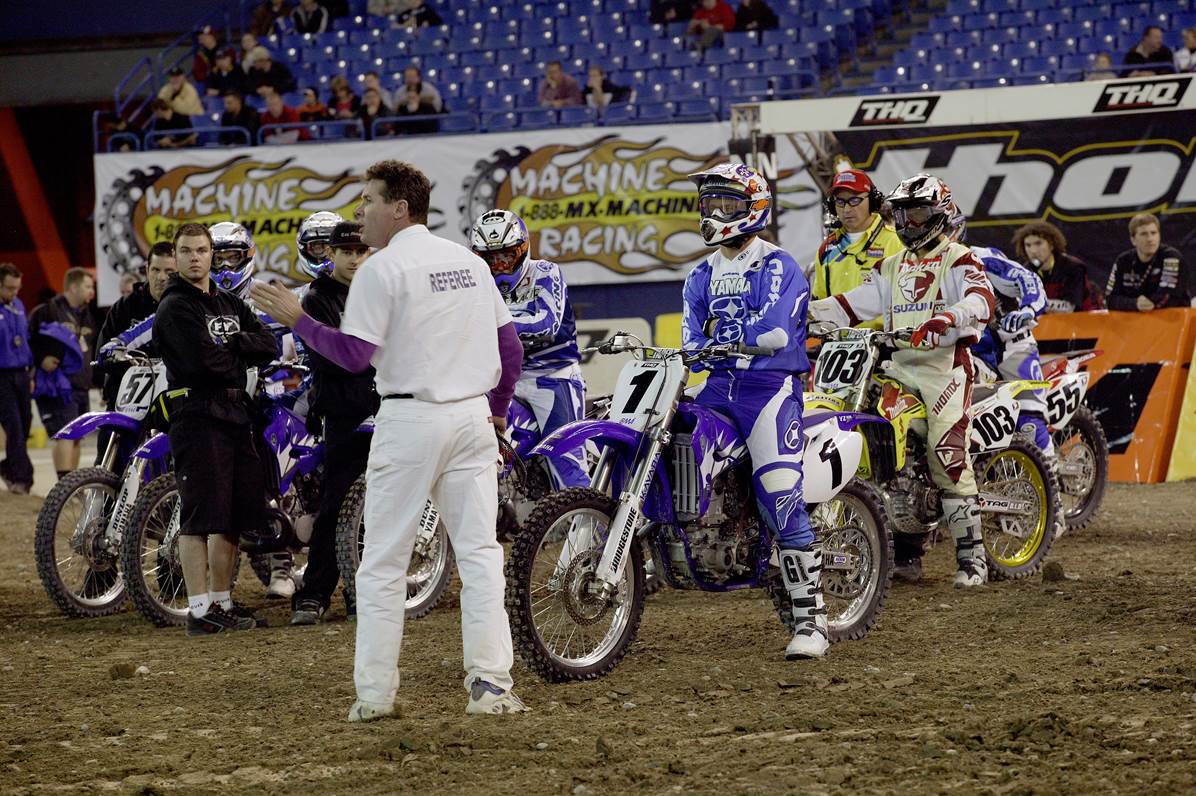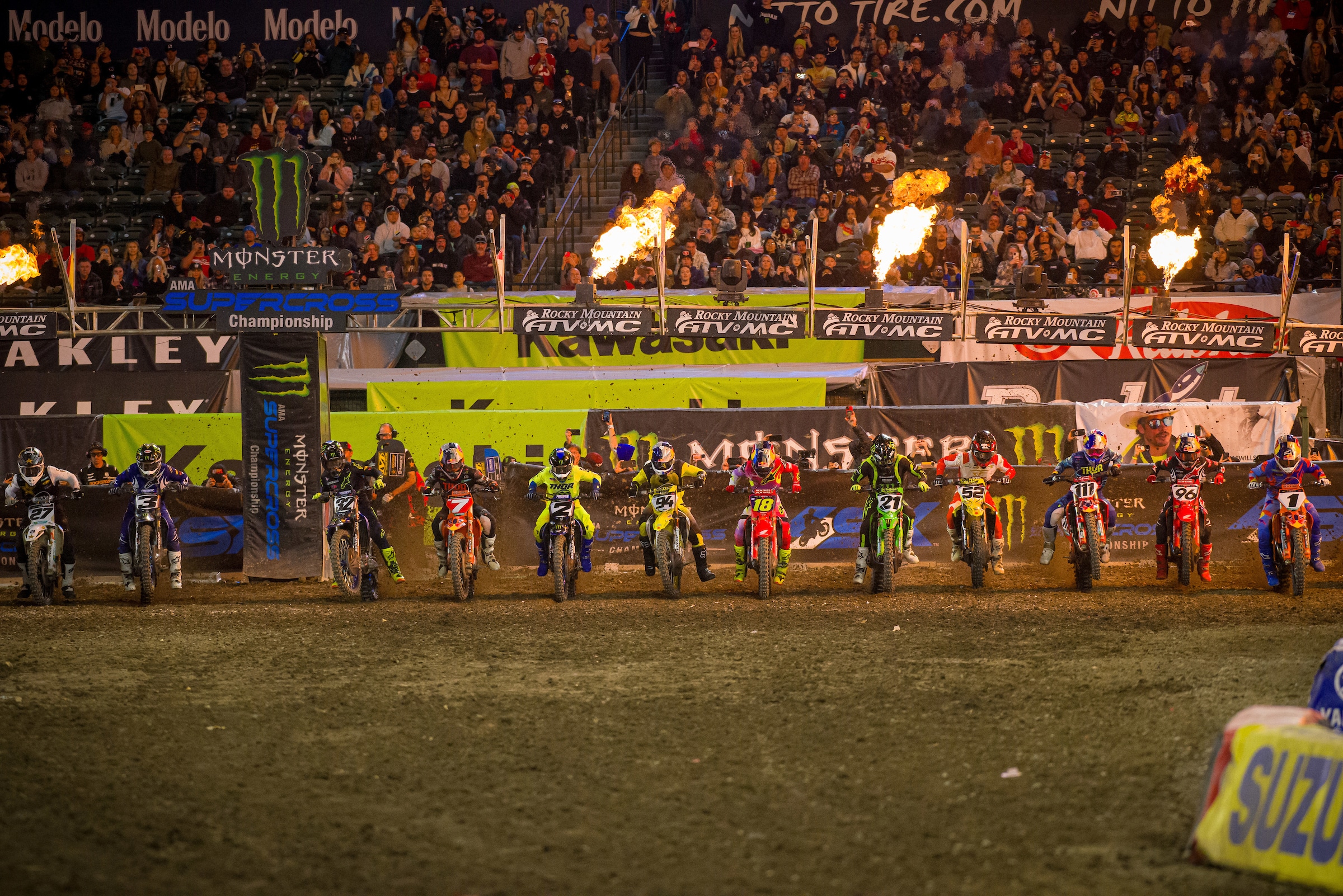Words by Mike McGill
Photos by Bill Petro
The passion for motocross is still very evident in his voice. At the age of sixty-seven, Andy Bokma has been a head official in Canadian motocross since 1980, and his dedication to the sport and the safety of its riders has not lessened with age. As you might expect he started out as a rider but quickly moved over to the officiating side of the sport when it became evident that his racing career was not going to take off. He’s officiated some of the biggest events in the history of Canadian motocross and still keeps his hand in it to this day. This is his story.
Born in Holland, Bokma and his family moved to Canada when he was quite young. His family moved to the U.S. where they lived in the Cleveland, Ohio area for several years before moving back to Canada and settling in Scarborough, Ontario when Bokma was fifteen. It wasn’t long after that he developed an interest in motorcycles and dirt bikes in particular, but it wasn’t until he was twenty-six-years-old that he tried his hand at racing motocross. “Yes, I got started a little late,” chuckles Bokma. “Especially when you consider how young they get them going at it these days.” Bokma has a six-year-old son that just started his racing career this season.
It was the late ‘70s and motocross was extremely popular in Ontario at the time. “I got a Kawasaki KDX 250, it had lights on it and everything, totally street legal. I started racing it in the MRAC Series. MRAC stood for the Motorcycle Racing Association of Canada and at the time the MRAC had a few tracks in and around the Toronto area. “I’d race Centennial Park on Wednesday nights and then go up north to Hepworth or Barrie, Ontario on the weekends,” remembers Bokma.

After more than one disagreement during the 1980’s, Andy Bokma and Ross Pederson were all smiles a few years ago at the Toronto SX.
Bokma absolutely loved the sport. While it soon became apparent to him that he would never be a National Champion as a rider, he found other ways to stay involved and quickly became part of the organizational and officiating crew for the MRAC. This lasted about three years and gave Bokma a solid officiating background in the sport. Experience which would turn out to be invaluable for him in later years.
“It was just a chance meeting,” recalls Bokma. “I met Marilynn Bastedo (who, at the time and to this day, still is the Chief Executive Officer for the Canadian Motorcycle Association) at the Toronto Motorcycle Show in 1980 and I just walked right up to her and offered my services as a referee.” To his surprise Bastedo accepted Bokma’s offer and the rest is, as they say, history. “It turned out to be a great fit,” continues Bokma. “Personally, I couldn’t afford to continue racing but by acting as a referee it allowed me to continue to participate in the sport I loved.” Bokma already had a level of experience as an official from overseeing the MRAC events over the previous few seasons and it wasn’t long before he was promoted to the position of Head Referee for CMA motocross, predominately in Ontario, but really throughout the country. “I’d work eight to ten local races over the course of the summer,” recalls Bokma, but then there were Nationals as well at the Toronto Supercross.”
“It wasn’t a full-time job or anything like that. I still had to work my day job as a welder, but it certainly helped. It wasn’t about the money for me, though,” continues Bokma. “Safety!” That’s what’s it’s all about for Andy Bokma, and this becomes very evident after speaking with him for only a short period of time. “It’s all about rider safety and the standards which need to be in place to ensure that every event is as safe as it can possibly be.” Throughout the ‘80s and early ‘90s at any CMA event, Bokma was famous for running a very tight ship. “Tech inspection, for example,” states Bokma, “it takes twenty seconds to check someone’s bike but in that twenty seconds I could find a possible problem that could save that rider from potential serious injury.”
Bokma was certainly seen as a no-nonsense type of guy during that period of Canadian racing and his views on the sport have not changed or softened one bit over the years. “I believe I was viewed by the riders and promoters from a position of strength. I was confident in my abilities and knew what I was doing.” As mentioned, rider safety has always been Bokma’s number one concern, and he even went as far as to cancel an Ontario Provincial event at Mono Centre back in ‘86 when he deemed that track conditions were unsafe. “It had been an unusually dry Spring,” remembers Bokma, “and the track was really dry and dusty. The Juniors were able to race on the Saturday but when it came to the Senior and Expert classes (known as Intermediate and Pro today) to run on the Sunday it was too dusty, so I cancelled it. Some people may have thought I went too far at times,” he chuckles. “Maybe they thought I was a real prick, but I really don’t care. When it comes to rider’s safety, I’m never going to take the easy way out.”
Bokma is extremely proud of the fact that in his nearly 40 years as a motocross official there has never been a fatality at any of his races. And he believes this is a direct testament to his relentless pursuit of standards and safety concerns. Of course, Bokma was equally as famous for cracking the whip on proper number placement, which drove a lot of riders, myself included, crazy over the years. “Once again it goes back to standards,” claims Bokma. “Correct number combinations are to be displayed on the bike, back of the jersey and helmet; it says it in the rulebook.” I personally found this out the hard way back in the early ‘90s while wearing a new chest-protector that I had not applied my numbers to yet at a race at Motopark. Bokma black-flagged me while I was doing well in my moto and gave me what seemed like an endlessly long lecture at the side of the track on the rules of proper number placement while the laps in my race slipped past. I was, of course, furious at the time but I have to say that I never made the mistake of going out for a race without displaying my proper numbers again, not when Andy Bokma was around anyways.
In fairness, Bokma’s enthusiasm and vigor for enforcing the rules was not only directed towards the lowly Junior and Intermediate riders such as myself, he was an equal opportunity rule enforcer and had his share of run-ins with some of the top names in the sport as well. “I pretty much had a ten-year run-in with Ross Pederson,” chuckles Bokma. Bokma goes on to describe his very first meeting with Canada’s greatest of all-time motocross racer. “There was a four or five race series back then that was run by a company named Dijer,” (‘Doin it in the dirt’ was their slogan). “The race took place at the Dagmar Ski Resort in Uxbridge, Ontario and it was a pretty cool track. Ross was making a pass for the lead in one of his motos and blew right off the track and completed the pass but went outside of the track marker, which was actually the post for one of the ski lifts.” Bokma explains that the rule at the time stated if a rider went off the track they had to turn around and re-enter the track at the same point as they exited. “I was standing right there with Al Jaggard,” continues Bokma, “and saw the whole thing. I had no alternative but to dock him five positions,” states Bokma. There was quite a bit of money on the line for this race series and the Rollerball was not too happy when he found out that he had been docked five positions and lost out on some serious cash.
“We had quite a discussion after the race,” remembers Bokma. So, Andy’s first meeting with Ross didn’t go that well and things didn’t really improve over the years. “I must have had at least twenty run-ins with Ross over the years,” Bokma states. “Once at an Ontario Provincial at Hully Gully, I believe it was, and Ross went out for his moto wearing his U.S. racing jersey that had the number 54 on the back rather than the number 1 to match his bike. Well, I black flagged him and held him until at least ten riders had passed before I let him go. Of course, he re-passed them all and still won the race,” chuckles Bokma. Perhaps the most serious incident between the two occurred at a race on the infield of the well-known road-racing facility at Shannonville, Ontario in the late ‘80s. “Much of the Yamaha brass was in attendance that day,” remembers Bokma, “and one of the only instructions we received from the road-course management group was that the motocross bikes were to stay off of the road course as it had just been freshly repaved and they didn’t want any mud or dirt getting onto it.” No sooner had Bokma been issued these instructions, he sees none other than Ross Pederson out on the road circuit doing a burn-out on his factory Yamaha. “Maybe he was trying to clean the mud out of his knobbies, I don’t know,” states Bokma, but that was it. I told him he was done for the day.” Ross went ahead and lined up for his moto anyway and a stand-off between the two ensued. “Ross said that if he didn’t ride nobody else would either,” recalls Bokma. Eventually, cooler heads did prevail and the races went ahead without Ross. “I never understood why he did that,” says Bokma.
“Ross was a headache for me, no doubt,” states Bokma, “but he was a great champion as well, the best we’ve ever had, and to his credit he did come to me after the Shannonville incident to tell me that he was going to stop effing with me. He said it was costing him too much money,” laughs Bokma. While Pederson and Bokma may have never seen eye to eye over the years, Bokma claims that his relationships with most of the top riders of the day was quite good. “Sure,” says Bokma. “Guys like Jeff Surwall, Doug Hoover, Carl Vaillancourt, I got along very well with all those guys, even when I had to enforce a rule on them. They were always pretty good about it. Bokma recalls an incident when he was told by another track official that Quebec native and multi-time National Champion Carl Vaillancourt had cut a small portion of the course at a National in Quebec. Based on the information that he had received, Bokma levied a penalty against Vaillancourt and docked him 5 positions. “Carl appealed it immediately,” remembers Bokma, “and since I hadn’t actually seen it with my own eyes, I had to uphold his appeal and give him the win.” Years later Vaillancourt confessed to Bokma that indeed he had cut the track that day. They both shared a good laugh about it well after the fact. “For the most part they were all really good guys,” states Bokma. “Not just the riders but for the most part the promoters as well. Bokma singles out Motopark’s Carl Bastedo, James Farrington from R.J.s Motorsports Park in Barrie and Lino and his father Joe Zecca as being particularly good in that regard. “They were always easy to work with” states Bokma. “if something needed to be changed all I had to do was ask and it would be taken care of.”
Perhaps the most infamous event in Bokma’s long, and for the most part illustrious, officiating career took place at the Vancouver SX back in 2006. The late Tyler “One Punch” Evans was battling with AMA Supercross veteran Keith Johnson for the last qualifying position in the LCQ when Bokma went viral, as they say these days, and became an overnight YouTube sensation. “Head of AMA officiating John Gallagher warned me that there might be trouble,” remembers Bokma. “And to his credit he was right.” Evans centre-punched Johnson coming into the final corner, sending both riders to the dirt. Instead of remounting and going for the checkers, and maybe it was because they were in Canada, both riders decided to square off and go at it. Evans had a reputation for extra-curricular activities, such as this, Johnson didn’t. Bokma, who was waiting for something like this to happen, was ready for it and sprang to action immediately, grabbing Evans by the shoulder pads and wrestling him to the ground. In the grand scheme of things, it wasn’t that big a deal, but the clip has been viewed millions of times over the years and seems to be included in countless numbers of Supercross montages on the internet. “It’s had quite the life-span,” chuckles Bokma when re-telling the story.
While he doesn’t referee all that often anymore, Bokma maintains all his credentials. In fact, he makes the trip to Geneva, Switzerland every summer to attend a seminar which allows him to update his FIM qualifications, and he does the same in Ohio to keep his AMA standards current. “It’s a good excuse to take a vacation to Europe,” Bokma states, “but it’s important to me as well.”
When asked about the state of racing today, particularly in the Ontario region, Bokma turns serious. “To be honest I’m not happy about it,” he states. Bokma’s six-year-old boy recently started participating at a local level and Bokma feels that all the safety standards that he worked for so many years to put into place have all but been forgotten by the new breed of racers and promoters. “I’ll put it to you this way,” says Bokma. “I hear people all the time say that they want to race with one organization or another because they don’t have any rules. That’s the attitude that a lot of people have these days and to be honest it makes me sick,” states Bokma bluntly. “I guess somebody’s going to have to get killed before anybody starts paying attention to safety standards again.”
To show that he’s not just all talk, Bokma recently took it upon himself and spent the entire day at a local track, at one of the final races of the season, flagging on what he perceived to be an unsafe jump on the peewee track. “They didn’t have enough flaggers,” states Bokma. “It was a blind jump, in my opinion, so I stayed there all day flagging it. I wasn’t able to go to the starting line with my son or anything but there was no way I was going to let that situation stay the way it was. No way!” No one thanked Bokma for going the extra mile to ensure the safety of the young riders on that day but that’s not what he’s all about. “I didn’t care about that,” states Bokma. “I was just making sure that all the kids were as safe as they could be out there.”
In a perfect world, states Bokma, “Everything would be under the same umbrella.” Many would not agree but Bokma does have some strong points to back up his case, and the fact that he has been around the sport for close to forty years probably tells you something about where his loyalties can be found. “Let’s put it this way,” says Bokma, “if you don’t have any standards, you don’t have safety. Anything can happen at any time as we know but nobody seems to get that anymore. If you try to institute some rules, everyone just bitches about it. They bitch about the rules, however anything can be corrected, and it wouldn’t be that difficult to bring it all back together again. It might cost the promoters a little more but really that’s all it would take.”
Until this happens, if it ever does, Bokma plans to keep his options open. “As I said, now that my son is racing and I’m back at the track I’m not really happy with what I’ve been seeing. We may go down to the States next season if things don’t improve.” Sentiments such as this may not make Bokma overly popular with the powers that be in Canadian motocross, but he really doesn’t care. “I plan to be aggressive,” states Bokma, “and I’ve got a few ideas up my sleeve so we will see what happens.”
We may be seeing a lot more of Andy Bokma in the near future, but whether this happens or not, his long and colourful career as a Head Referee certainly adds another interesting chapter to the ongoing history of Canadian Motocross.







